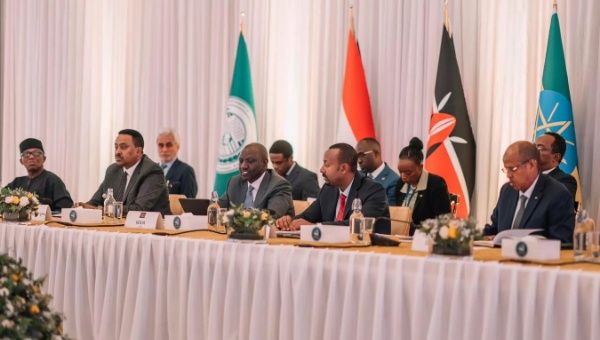IGAD: Solutions for Sudan crisis

Report – Sudan Event
On the 10th of last July, meetings of the Quartet formed by the Intergovernmental Authority for Development (IGAD) to discuss the Sudan crisis were held in the Ethiopian capital, Addis Ababa, headed by Kenyan President William Ruto and in the presence of the heads of IGAD, the US Assistant Secretary of State for African Affairs, the International Quartet, and representatives oods in Khartoum State.f the United Nations and the African Union. This was the summit that Sudan announced in advance, that it had reservations about it by rejecting its biased presidency and the need for South Sudan to chair it. However, Sudan delegation was present in Addis, but it refused to participate unless its position was responded to. Sudan’s strong position on that day constituted the first genes of failure for the summit, which continued its failure with the apology of the other two members complementing its membership, in addition to Kenya and Ethiopia, namely Djibouti and the State of South Sudan for attending, thus making the summit appear closer to bilateralism and failed
Now, after about five months, the IGAD summit at the level of heads of state and government is back to convene in Djibouti. Its meetings are expected to convene on the 9th of December to see how to find solutions to the Sudan crisis.
The IGAD meetings this time come after international pressure and heated criticism of the lack of an African role in contributing to resolving the Sudan crisis.
what is IGAD which tries to resolve the conflict?
IGAD is a sub-regional African governmental organization established in 1996. It is headquartered in Djibouti and includes: Ethiopia, Kenya, Uganda, Somalia, Djibouti, Eritrea, Sudan, and South Sudan.
It replaces the Intergovernmental Authority on Drought and Development (IGADD), which was established in 1986 for mitigating the effects of recurring severe droughts and other natural disasters that led to widespread famine, environmental degradation and economic difficulties in the region.
Djibouti, Ethiopia, Kenya, Somalia, Sudan and Uganda have taken action through the United Nations to establish an intergovernmental body for development and combating drought in their region. Eritrea became the seventh member after gaining independence in 1993, and in 2011 South Sudan joined IGAD as the eighth member.
Proactive tours
Sudan, in turn, was diplomatically active in arranging for convening this summit. General Al-Burhan, Commander of the Sudanese Army, recently completed a shuttled diplomacy that took him to Nairobi and Addis Ababa, two capitals in the region that he had initially avoided. On November 26, Al-Burhan met the President of Djibouti, President Ismail Omar Guelleh, head of IGAD, Executive Secretary Workneh Gebehu in Djibouti, and Eritrean leader Isaias Afwerki in Asmara, the man with the most recent scathing description of IGAD’s initiatives as “political bazaars.” Al-Burhan’s recent rounds discussed the security and humanitarian situation in Sudan.
Position correction
The upcoming summit
In addition to its political agenda, it will discuss the humanitarian situation in Sudan, where about six million people have been displaced and more than 11,000 people have been killed since the outbreak of war in mid-April.
The Intergovernmental Authority on Development (IGAD) is scheduled to correct its previous position and amend its mediation program regarding Sudan, which included the establishment of a quartet of countries including Kenya, Djibouti, Ethiopia and South Sudan to lead dialogue between the warring parties, which Sudan had previously rejected.
According to IGAD tradition, the summit decision cannot be canceled or amended except through a similar session, which is what is expected to happen at the summit of the 9th of December, which will achieve a new victory for Sudanese diplomacy on the 9th of this December, the date of the summit.



